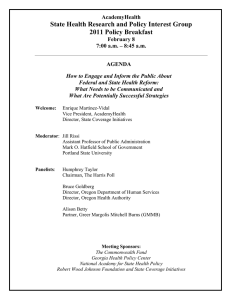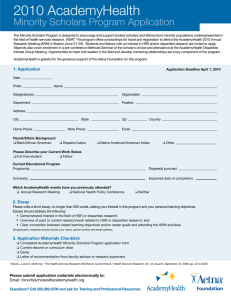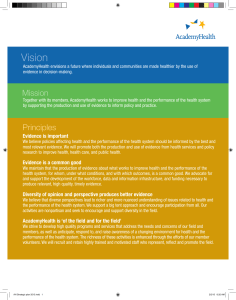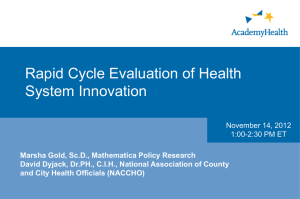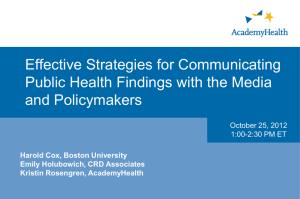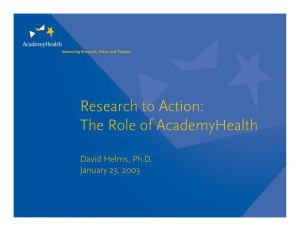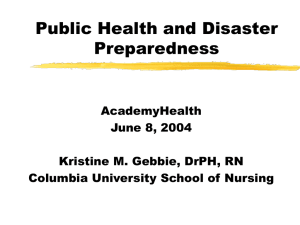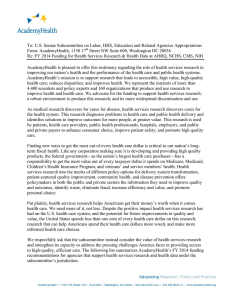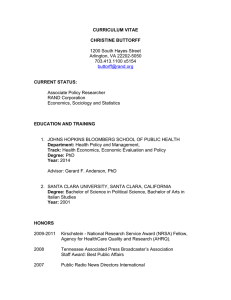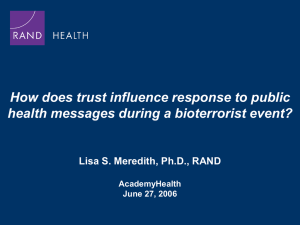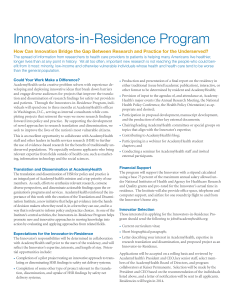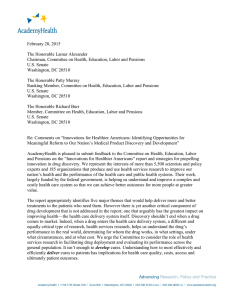August 12, 2014 The Honorable Ron Wyden The Honorable Chuck Grassley
advertisement
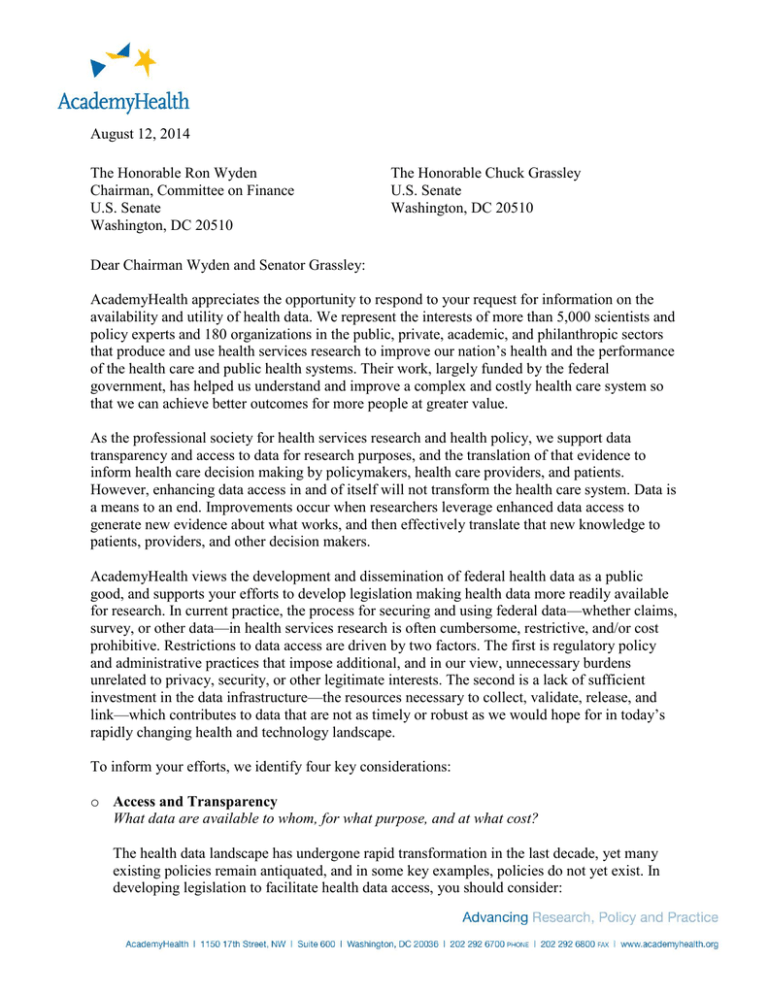
August 12, 2014 The Honorable Ron Wyden Chairman, Committee on Finance U.S. Senate Washington, DC 20510 The Honorable Chuck Grassley U.S. Senate Washington, DC 20510 Dear Chairman Wyden and Senator Grassley: AcademyHealth appreciates the opportunity to respond to your request for information on the availability and utility of health data. We represent the interests of more than 5,000 scientists and policy experts and 180 organizations in the public, private, academic, and philanthropic sectors that produce and use health services research to improve our nation’s health and the performance of the health care and public health systems. Their work, largely funded by the federal government, has helped us understand and improve a complex and costly health care system so that we can achieve better outcomes for more people at greater value. As the professional society for health services research and health policy, we support data transparency and access to data for research purposes, and the translation of that evidence to inform health care decision making by policymakers, health care providers, and patients. However, enhancing data access in and of itself will not transform the health care system. Data is a means to an end. Improvements occur when researchers leverage enhanced data access to generate new evidence about what works, and then effectively translate that new knowledge to patients, providers, and other decision makers. AcademyHealth views the development and dissemination of federal health data as a public good, and supports your efforts to develop legislation making health data more readily available for research. In current practice, the process for securing and using federal data—whether claims, survey, or other data—in health services research is often cumbersome, restrictive, and/or cost prohibitive. Restrictions to data access are driven by two factors. The first is regulatory policy and administrative practices that impose additional, and in our view, unnecessary burdens unrelated to privacy, security, or other legitimate interests. The second is a lack of sufficient investment in the data infrastructure—the resources necessary to collect, validate, release, and link—which contributes to data that are not as timely or robust as we would hope for in today’s rapidly changing health and technology landscape. To inform your efforts, we identify four key considerations: o Access and Transparency What data are available to whom, for what purpose, and at what cost? The health data landscape has undergone rapid transformation in the last decade, yet many existing policies remain antiquated, and in some key examples, policies do not yet exist. In developing legislation to facilitate health data access, you should consider: Source of Health Data: There are myriad federal and state data sources related to health, e.g., claims data, survey data, vital statistics, electronic health records, enrollment data, as well as other data sources that provide important context for understanding health, e.g., the U.S. Census and the American Community Survey. There are also private-sector, proprietary data that are important for understanding health, and data generated through public-private partnerships or quasi-governmental data sources, e.g., PCORNet. There is currently no standardized way to identify types of data, and no clear policies around access to federal/state or quasi-governmental data, e.g., Medicaid, CHIP, and the new health insurance marketplace. Qualified Entities: AcademyHealth supports policies that make health data more readily accessible to researchers—both those in the public, private, and nonprofit/academic sectors. However, there is value in expanding access to other users such as policymakers, regulators, or the general public. Currently, “qualified entities” are allowed to use certain federal data for certain purposes, but these entities and uses are very limited. For example, the Patient Protection and Affordable Care Act notes that qualified entities “may use the information obtained under…the Act for the purpose of evaluating the performance of providers and suppliers, and to generate public reports regarding such performance,” and these reports “may only include information on individual providers and suppliers at the aggregate form, that is, at the provider or supplier level.i” Data Uses: AcademyHealth supports efforts to expand health data access for research and related purposes—including research, evaluation, demonstrations, and quality improvement activities. But there may be value in expanding use for general purposes beyond research, such as price and performance transparency. Data Costs: Datasets are often inaccessible because of their high costs. At the same time, high quality, timely data do not come without a price; there are significant expenses associated with collecting, cleaning, releasing, and appropriately managing reliable, accurate health data. Policies designed to facilitate data access should strike the appropriate balance between timeliness, quality, and affordability. Niall Brennan, Jon Blum, and Michael Davern and the NORC CMS data enclave are making strides in how to remove barriers by making data available in more efficient, less costly, and more innovative ways that may be helpful to you in your efforts. o Safeguards What is the federal government’s role in monitoring and protecting data once released? In seeking to release more health data, more quickly, to more users, for more purposes, it will be important to establish safeguards to monitor data use, protect individuals’ privacy, and preserve the public’s trust. With greater access comes the need for stringent and innovative measures for protecting data, including significant penalties for those who use data inappropriately and “promising practices” for those who adhere to data standards—oversight that goes beyond that of the Office for Civil Rights (OCR). In so doing, it is important to understand what current auditing functions exist and determine how they may be modified and scaled to facilitate greater access while mitigating misuse and punishing bad actors. o Quality How should the government handle the validation of data prior to its release? Data must be reliable to effectively inform decisions and transform health, thus data quality is paramount to any effort to enhance access to any data, be it federal or state data, public or private data, medical records or claims, registries or surveys. Data need not be perfect—in fact, data may never be—but what level of latency is acceptable? Lawmakers should explicitly consider the tradeoffs of releasing “messy data” quickly versus “clean data” that is outdated. The intended uses and users of the data may drive considerations about quality and determinations about when “good is good enough.” In addition, there is great value in integrating data sets to truly understand health and the implications of health policy decisions. Health data are housed at many federal agencies—the Agency for Healthcare Research and Quality, Centers of Medicare and Medicaid Services, Centers for Disease Control and Prevention, among them—and across many federal departments, not to mention states, quasi-governmental organizations, and the private sector. Rarely do these entities coordinate data collection or integration efforts. Sometimes, it is an issue of policy, but more often it is an issue of inadequate methods, technological limitations, and insufficient resources. Nonetheless, data integration is the key to unlocking more robust health data and better health decision-making by patients, providers, and policymakers. o Translation How do we move raw data into information that is actionable and can ultimately lead to health improvement? Simply releasing raw health care data publicly does not mean that it will be organized, analyzed, and interpreted in a way that truly informs decision making. In reality, raw data only provide a piece of the story. Data are only useful if there are trained individuals from diverse backgrounds who are able to transform data into actionable knowledge. In fact, publicly released data in the absence of the appropriate context can do more harm than good. Health services research is essential to this interpretation of data and sense-making. Any data access policy should seek to cultivate a learning community of practice so data may be transformed into information, knowledge, and ultimately the wisdom that is useful to both the public and private sectors.ii To be sure, there are costs associated with enhancing usability. A soon-to-be published eGEMs paper will provide cost estimates of data translation and address issues of sustainability; we would be pleased to share once available. i Medicare Program Availability of Medicare Data for Performance Measurement, Federal Register Notice, https://www.federalregister.gov/articles/2011/12/07/2011-31232/medicare-program-availability-of-medicare-datafor-performance-measurement#h-7 ii See R. Logan: http://ecolabsblog.wordpress.com/2010/11/29/data-information-knowledge-and-wisdom/ We look forward to working with the Committee on this important data access initiative. If you have questions about these comments, please don’t hesitate to contact Dr. Lisa Simpson, President & CEO of AcademyHealth, at 202.292.6747 or lisa.simpson@academyhealth.org. Sincerely, Lisa Simpson, MB, BCh, MPH President and Chief Executive Officer AcademyHealth
